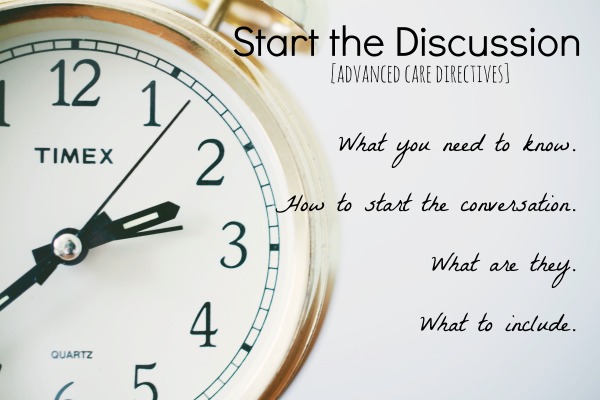This is a sponsored conversation for National Healthcare Decisions Day. All thoughts and opinions are my own.

According to a national survey, more than 90% of the people think it’s important to talk about their loved ones’ and their own wishes for end-of-life care, but fewer than 30% of people have actually had the conversation.
Most people simply haven’t taken the time to formalize their decisions. And often times people don’t know how to broach the subject with their loved ones. First, let’s get started with some baseline questions on advanced care directives.
What is an advanced care directive? A document to execute important medical decisions when facing a life threatening illness, injury, or progressive illness.
What should it cover? This depends on your wishes. It could cover an agent to speak on your behalf when you are unable to. A living will with certain health wishes is often included. Be mindful of using terms like always and never as these are fairly strong terms.

- Think about what is most important to you. What are your greatest fears, hopes and goals? Who would you prefer to make decisions on your behalf with your physicians if you could not? How sure are you of your choices? Do you want your chosen proxy to have leeway to change your decisions? Now you are ready to discuss these topics with your loved ones to reach a shared understanding of your desires.
- Talk with your loved ones. Honest communication can help families avoid the stress of guessing what a family member would have wanted. Be open with each other and focus on really understanding the views of those you love. You may find that you and your loved ones may see some things differently. That’s okay. Talk through it, listen and keep an open mind.
- Make it official. Once you’ve had the conversation, formalize your decisions by putting them in writing. There are several ways. An advance directive can help describe your medical wishes when you no longer can. Special medical orders can be developed with your doctor. Finally, a health care proxy identifies your health care agent—the person you trust to act on your behalf if you are unable to make decisions or communicate your wishes.
- Get help. You can find valuable resources to help you think through these issues and make decisions more manageable at www.optumcare.com and theconversationproject.org.
Getting started doesn’t have to be tough or awkward. The key is starting the conversation early. Have these powerful conversations now to ensure these important preferences are honored, reduce the stress and uncertainty in the future. Planning today means taking comfort tomorrow in knowing that your loved ones don’t have to make these difficult decisions blindly.
It’s such a tricky topic but so important. My Dad passed away without anything planned out. It made a difficult time even harder. So yes it’s awkward, but so much easier to talk about when everyone is healthy!
we should do some physical training along with a healthy and balanced diet. As we know sound mind in a sound body.